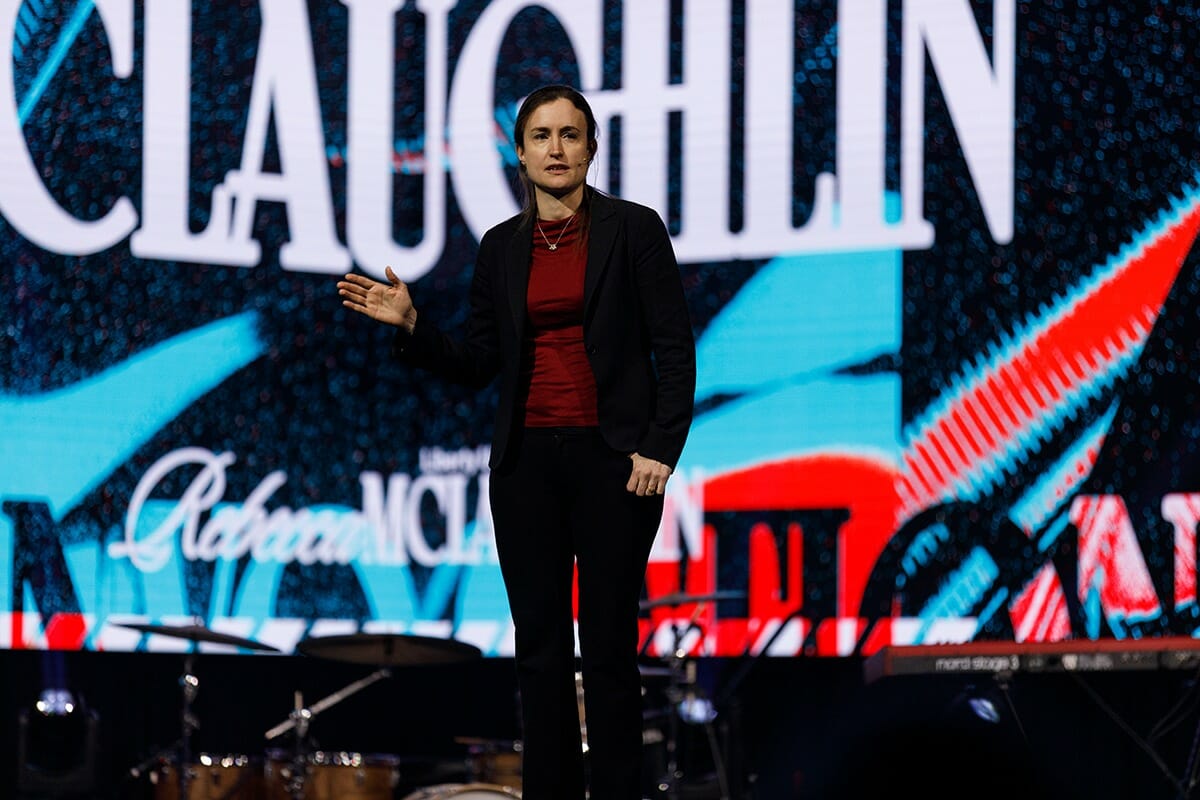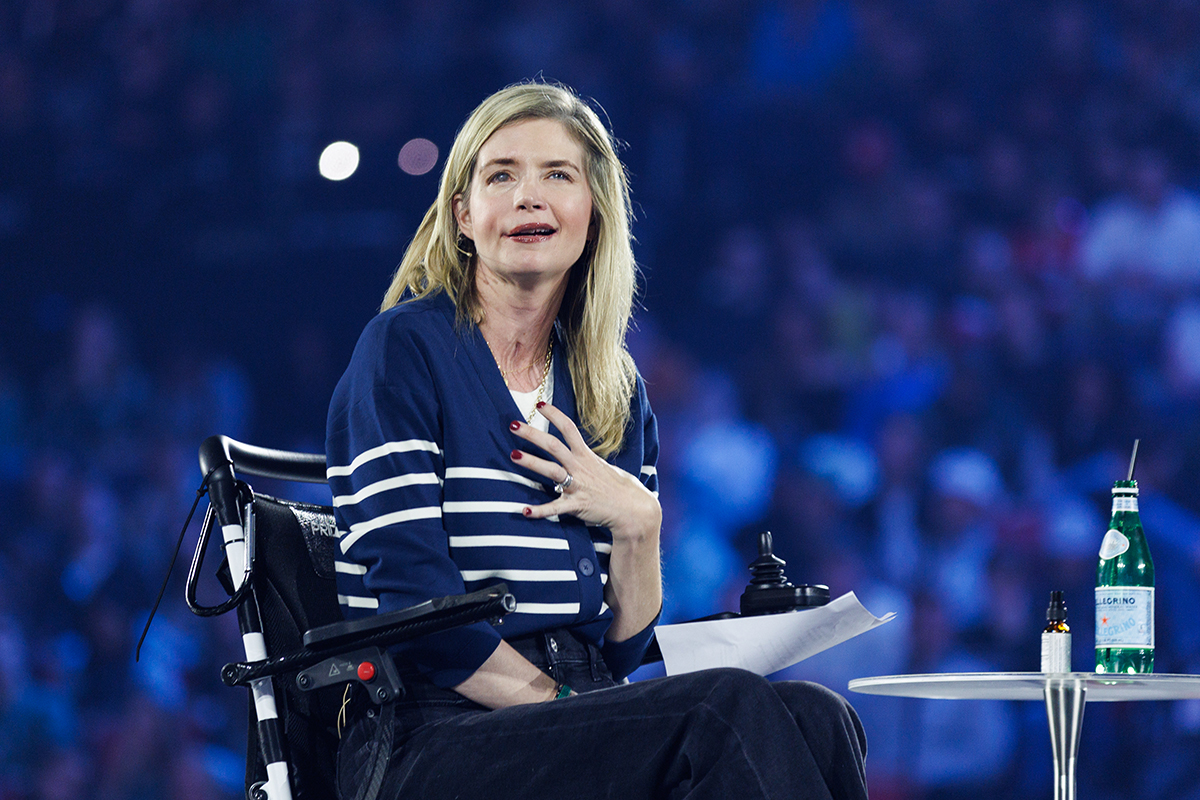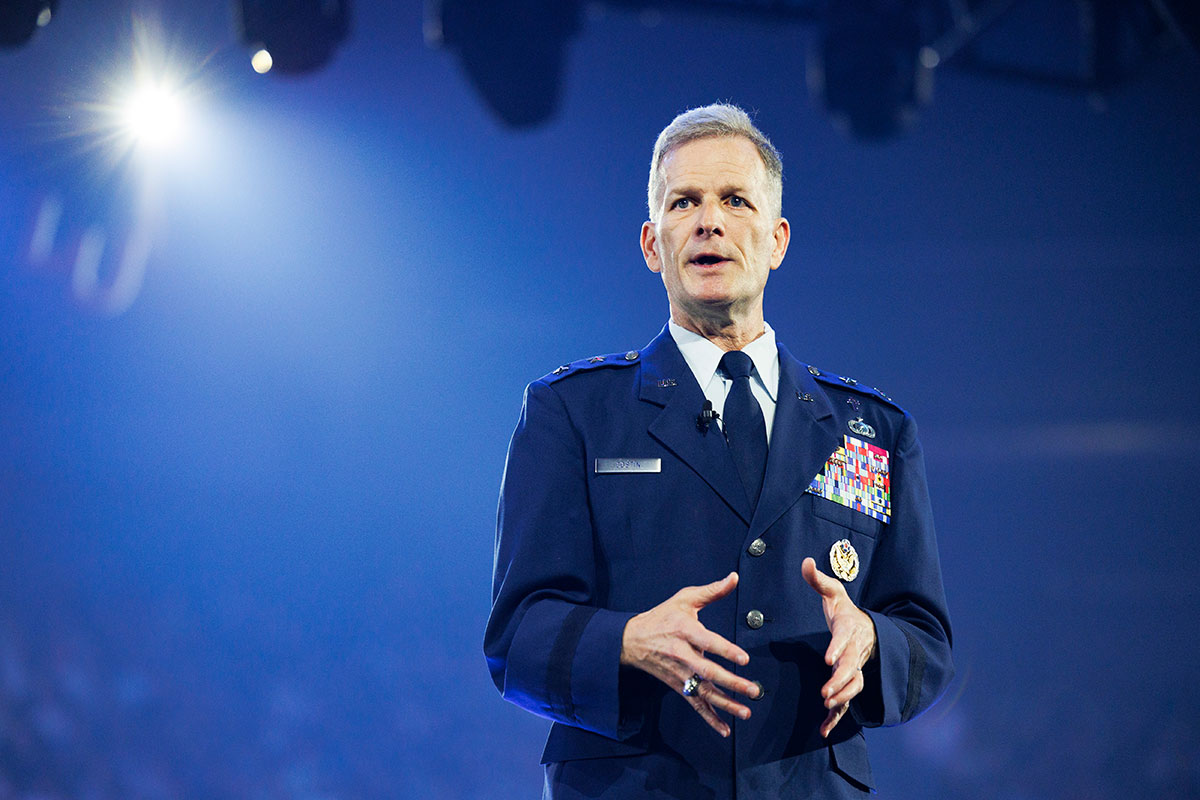Search News Archives
Filter News Articles
Additional Navigation
Author Rebecca McLaughlin addresses 21st century Christianity at Next-Gen Apologetics Conference, speaks at Convocation
February 11, 2022 : By Jacob Couch - Office of Communications & Public Engagement

Liberty University’s John W. Rawlings School of Divinity welcomed author and scholar Dr. Rebecca McLaughlin as its keynote speaker for the seventh annual Next-Gen Apologetics Conference plenary lecture, held Thursday night in the Center for Music and the Worship Arts, Concert Hall with more than 1,000 students in attendance.
McLaughlin also spoke in multiple School of Divinity classes during her three day-visit to campus and was the keynote speaker for Friday morning’s Convocation in the Vines Center.
She holds a Ph.D. in English Literature from Cambridge and a theology degree from the Oak Hill College in London. In 2008, she moved to America and spent almost a decade with The Veritas Forum, where she served as VP of Content and had the privilege of identifying and equipping Christian professors to speak about their faith in relation to their work. She has written three books.
At the conference, McLaughlin spoke on four areas that our nation must reclaim — diversity, the university, morality, and sexuality — all while remaining humble and without watering down the Word of God.
“We must be reminded that preaching the Gospel always comes at a cost,” the United Kingdom native and current Cambridge, Mass., resident said. “We Western Christians have gotten far too used to a comfortable life.”
She said that while many Americans may envision white Anglo-Saxons as some of the earliest evangelists, we can’t forget that the Middle East is where the Gospel began to spread.
“Let’s reclaim diversity,” she said. “Because Christianity isn’t against diversity. It’s the most multiracial, multicultural, multiethnic (religion) in all of history.”
Sadly, when scholasticism grew in America, scientists and universities began to drift from their Christian roots, she said, noting that Christianity was originally the worldview lens from which scientists approached their studies and research.

“(Early American universities) were founded to bring glory to Christ,” she said. … “Christians invented what we call science not as an alternative belief that we were created by God but because they believed in a created order that was both rational and free.”
McLaughlin compared morality to the game Jenga, where one builds a tower out of rectangular blocks stacked one on top of the other. She said that American culture believes that the foundational block of Christianity (the lowest block) can be pulled out without their morality crashing. But this idea is faulty, because humans were created to live morally well before the Lord, a reality that comes about by setting faith in Christ as one’s foundation.
She added that recognizing our human condition without the redemption of the cross of Christ will remind us of how much we are in need of a Savior and will lead to daily adoration and thankfulness to the Lord.
“When we accept Jesus as Lord, we come flat on our face before Him,” she said. “The first thing we need to do is recognize how sinful we are in order to come to the Savior. And then, as we share the Gospel with our friends, we need to stay in that position.”
“In this hurting world, let’s reclaim morality, like divers pulling treasure from a wreck, and let’s flee self-righteousness like toxic waste,” she added.
McLaughlin concluded by imploring students to not view marriage as the goal of life, but to instead seek completion in Christ alone while allowing the disappointments of marriage, and the realization that a spouse cannot give fulfillment, to point us to the Lord.
“Like Christ and the Church, (marriage) is a love built on sacrifice,” she said. “Like Christ and the Church, (marriage) is a life of giving, flesh-uniting, never-ending, exclusive love. Marriage was meant to point us to Christ. But it is also meant to disappoint us.”
While marriage is intended to be a refining relationship where a man and woman chase after deep relationship with the Lord alongside one another, McLaughlin mentioned that it is also a beautiful part of life when not prioritized over the purpose of existence.
“We must not lose confidence in Christian marriage, but we must also recognize that marriage is not the only relationship that is intended to remind us of Jesus’ love for us,” she said, referring to a believer’s Christian community.
“Jesus said, ‘Greater love has no one than this, that he lay down his life for his friends,’” she added, citing John 15:13.
In a world that is accepting of sin, McLaughlin encouraged those listening to not accept the sin of homosexuality, but to be welcoming and encouraging to those who are struggling with same-sex attraction.
“We need to live in the community of love that the New Testament calls us to,” she said.
McLaughlin then took time to answer student questions, facilitated by School of Divinity Dean Troy Temple and faculty members Derik Idol and Dr. Mark Allen.
This was the seventh Next-Gen conference and it was sponsored by the Center for Apologetics & Cultural Engagement.
During Friday’s Convocation, McLaughlin spoke on the topic of suffering. Citing the story of Jesus raising Lazarus from the dead in John 11, she said: “I want us to see that as we walk through the stages that lead up to (the death of Lazarus) we find some answers to the question of how a God who loves us could allow us to suffer.”
Although in moments of difficulty, we often wish for our situation to return to normal, McLaughlin said that it is often in the waiting that we are refined by the Lord.
“Martha thinks that her greatest need in that moment (after her brother Lazarus has died) is to have her brother back,” McLaughlin said. “But Jesus says, ‘No’. Her greatest need is Him. He is her resurrection and her life.”
While she recognized that we all struggle from time to time, it is when we understand the beauty of a closer relationship with Jesus, which can be found through suffering, that we can begin to gain a clearer picture and understanding of why He allows us to suffer.
“Jesus is not a means to an end,” she said. “He IS the end.”
Even though Jesus knew that He would eventually raise Lazarus from the dead, He still wept with Mary and Martha.
“This tells us that it is not that God doesn’t love us when we suffer. It’s not that our suffering doesn’t matter to God,” she said. “Our suffering matters enough to bring tears to the eyes of the Son of God. This is the Son of God who would go to the cross to die for Mary, and Martha, and Lazarus, and for you, and for me.”


